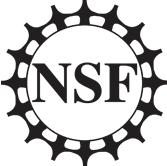Welcome!
This site provides a portal to access resources being developed through funding by the NSF Plant Genome Program (grant IOS-1339130; June 2014-June 2018). The broad goal of the project is to elucidate the biogenesis, differentiation, and environmental adaptation of chloroplasts. Chloroplasts are sub-cellular organelles in plants and algae that house the machinery for photosynthesis and numerous other essential metabolic processes. Chloroplasts are dynamic organelles that acquire different forms and functions in different cell types, and that adapt rapidly to changes in the environment.
The goals of this project are to:
- Use a large-scale forward genetic strategy to assign molecular and physiological functions to ~100 genes in maize that are required for photosynthesis
- Use genome-wide ribosome profiling to define the translatome dynamics underlying the installation of the photosynthetic apparatus during maize leaf development, and the distinct proteomes in bundle sheath and mesophyll cells
- Provide a comprehensive description of the progression of mitochondrial and plastid gene expression during the differentiation of photosynthetic leaf tissue
- Discover how regulated translation in the cytosol and chloroplast contribute to maintaining photosynthetic homeostasis under shifting light conditions
We use maize as the experimental organism because it is a C4 plant with dimorphic chloroplasts, it offers a rich collection of chloroplast biogenesis mutants, and the maize leaf blade is an excellent experimental system for describing the developmental progression through which meristematic cells differentiate into photosynthetically-competent leaf cells.
These research goals are integrated with the provision of the following community resources and educational opportunities:
- ~6000 new sequence-indexed Mu insertions which can be accessed together with previously cataloged insertions via MaizeGDB and an in-house search interface
- a gene identification service for putative Mu-tagged alleles from other groups; click here to request this service.
- large-scale translatome and transcriptome datasets for the elucidation of coexpression modules and associated functional inferences
- The POGs2 Database, which facilitates cross-species functional inferences by displaying key functional attributes of orthologous proteins in maize, Arabidopsis, rice, and poplar.
- A laboratory course for University of Oregon undergraduates that will be integrated with the large-scale identification of mutations underlying defects in chloroplast biogenesis.
- An outreach program in St. Louis that will engage secondary school students in hands-on analysis of photosynthetic mutants in foxtail millet.
